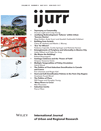Eco-cities have attracted international attention from governments, corporations, academics and other actors seeking to use sustainable urban planning to reduce urban environmental impacts. China has devoted significant political will and economic resources to the development of new-build eco-city projects, reflecting the Chinese government’s goals to build a ‘harmonious society’ in which environmental sustainability and social stability are mutually reinforcing. We critically analyse the case of the Sino-Singapore Tianjin eco-city to demonstrate that the eco-city’s ecologically modernizing visions of eco-urbanism construct a protective environment for its residents that constrains broader consideration of social sustainability. Through analysis of the marketing and presentation of specific domestic and other spaces of the eco-city, we examine the application of ecologically modernizing construction and technology to the design of the city. We argue that the eco-city is discursively constructed as ecologically beneficial for its inhabitants rather than for the broader socio-environmental landscape. Our analysis of residential spaces in Tianjin eco-city introduces the question of what ‘eco’ means when considering the construction of eco-urban environments for the city’s residents.
Details
Written by:
Federico Caprotti, Cecilia Springer and Nichola Harmer
Digital Object Identifier (DOI)
10.1111/1468-2427.12233
About DOI
Read full article as PDF
Read full article as HTML
See the references for this article

